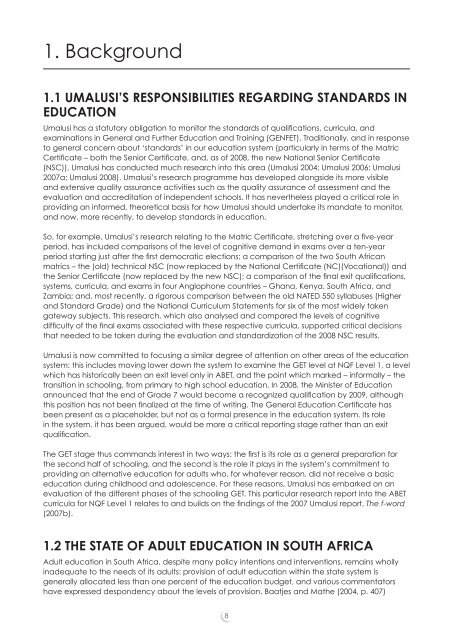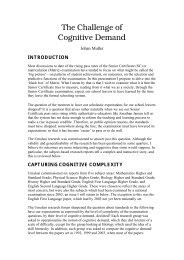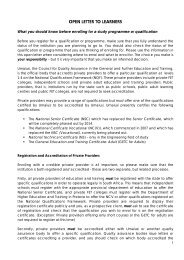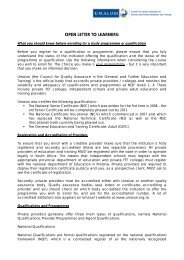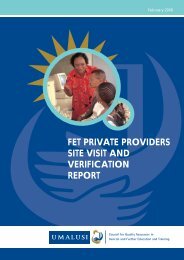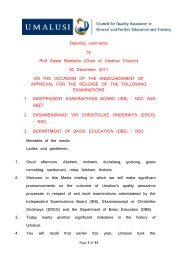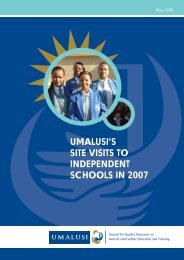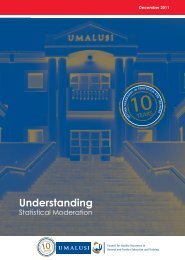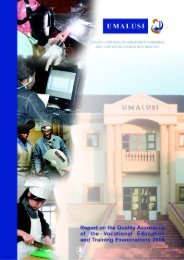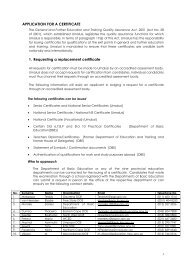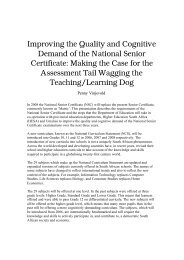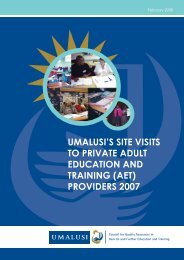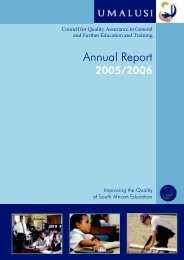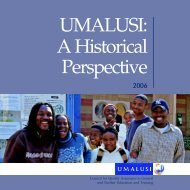Inspecting the Foundations - Umalusi
Inspecting the Foundations - Umalusi
Inspecting the Foundations - Umalusi
You also want an ePaper? Increase the reach of your titles
YUMPU automatically turns print PDFs into web optimized ePapers that Google loves.
1. Background1.1 UMALUSI’S RESPONSIBILITIES REGARDING STANDARDS INEDUCATION<strong>Umalusi</strong> has a statutory obligation to monitor <strong>the</strong> standards of qualifi cations, curricula, andexaminations in General and Fur<strong>the</strong>r Education and Training (GENFET). Traditionally, and in responseto general concern about ‘standards’ in our education system (particularly in terms of <strong>the</strong> MatricCertifi cate – both <strong>the</strong> Senior Certifi cate, and, as of 2008, <strong>the</strong> new National Senior Certifi cate(NSC)), <strong>Umalusi</strong> has conducted much research into this area (<strong>Umalusi</strong> 2004; <strong>Umalusi</strong> 2006; <strong>Umalusi</strong>2007a; <strong>Umalusi</strong> 2008). <strong>Umalusi</strong>’s research programme has developed alongside its more visibleand extensive quality assurance activities such as <strong>the</strong> quality assurance of assessment and <strong>the</strong>evaluation and accreditation of independent schools. It has never<strong>the</strong>less played a critical role inproviding an informed, <strong>the</strong>oretical basis for how <strong>Umalusi</strong> should undertake its mandate to monitor,and now, more recently, to develop standards in education.So, for example, <strong>Umalusi</strong>’s research relating to <strong>the</strong> Matric Certifi cate, stretching over a fi ve-yearperiod, has included comparisons of <strong>the</strong> level of cognitive demand in exams over a ten-yearperiod starting just after <strong>the</strong> fi rst democratic elections; a comparison of <strong>the</strong> two South Africanmatrics – <strong>the</strong> (old) technical NSC (now replaced by <strong>the</strong> National Certifi cate (NC)(Vocational)) and<strong>the</strong> Senior Certifi cate (now replaced by <strong>the</strong> new NSC); a comparison of <strong>the</strong> fi nal exit qualifi cations,systems, curricula, and exams in four Anglophone countries – Ghana, Kenya, South Africa, andZambia; and, most recently, a rigorous comparison between <strong>the</strong> old NATED 550 syllabuses (Higherand Standard Grade) and <strong>the</strong> National Curriculum Statements for six of <strong>the</strong> most widely takengateway subjects. This research, which also analysed and compared <strong>the</strong> levels of cognitivediffi culty of <strong>the</strong> fi nal exams associated with <strong>the</strong>se respective curricula, supported critical decisionsthat needed to be taken during <strong>the</strong> evaluation and standardization of <strong>the</strong> 2008 NSC results.<strong>Umalusi</strong> is now committed to focusing a similar degree of attention on o<strong>the</strong>r areas of <strong>the</strong> educationsystem: this includes moving lower down <strong>the</strong> system to examine <strong>the</strong> GET level at NQF Level 1, a levelwhich has historically been an exit level only in ABET, and <strong>the</strong> point which marked – informally – <strong>the</strong>transition in schooling, from primary to high school education. In 2008, <strong>the</strong> Minister of Educationannounced that <strong>the</strong> end of Grade 7 would become a recognized qualifi cation by 2009, althoughthis position has not been fi nalized at <strong>the</strong> time of writing. The General Education Certifi cate hasbeen present as a placeholder, but not as a formal presence in <strong>the</strong> education system. Its rolein <strong>the</strong> system, it has been argued, would be more a critical reporting stage ra<strong>the</strong>r than an exitqualifi cation.The GET stage thus commands interest in two ways: <strong>the</strong> fi rst is its role as a general preparation for<strong>the</strong> second half of schooling, and <strong>the</strong> second is <strong>the</strong> role it plays in <strong>the</strong> system’s commitment toproviding an alternative education for adults who, for whatever reason, did not receive a basiceducation during childhood and adolescence. For <strong>the</strong>se reasons, <strong>Umalusi</strong> has embarked on anevaluation of <strong>the</strong> different phases of <strong>the</strong> schooling GET. This particular research report into <strong>the</strong> ABETcurricula for NQF Level 1 relates to and builds on <strong>the</strong> fi ndings of <strong>the</strong> 2007 <strong>Umalusi</strong> report, The f-word(2007b).1.2 THE STATE OF ADULT EDUCATION IN SOUTH AFRICAAdult education in South Africa, despite many policy intentions and interventions, remains whollyinadequate to <strong>the</strong> needs of its adults: provision of adult education within <strong>the</strong> state system isgenerally allocated less than one percent of <strong>the</strong> education budget, and various commentatorshave expressed despondency about <strong>the</strong> levels of provision. Baatjes and Ma<strong>the</strong> (2004, p. 407)8


